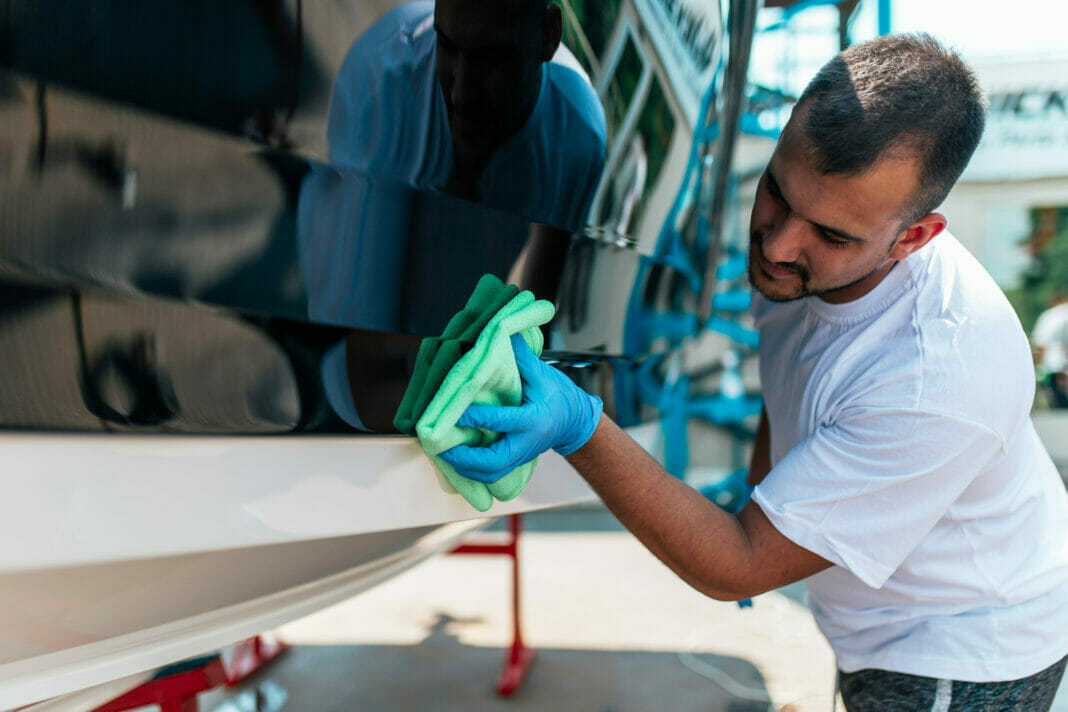Life with a boat has two distinct phases. First, there’s the honeymoon phase, where everything seems perfect; then comes the time when you can’t ignore your vessel’s maintenance needs any longer.
For committed boat lovers, the second phase is an unavoidable part of boat ownership. Cleaning and maintaining a boat is a big job, but if you can keep that vision of yourself speeding through the water in your mind, the hard work won’t be such a pain.
Here are a few of the necessary steps to keep your boat ship-shape (no pun intended).
Start with the Hull
You’ll need to bring your boat out of the water for proper hull cleaning and waxing. Once you have it on your trailer, you can examine the hull for signs of damage, such as deformations or cracks. If nothing needs repairing, break out the buckets and soap for a solid cleaning.
If at all possible, use a specialty boat cleaners that’s gentle and environmentally friendly. Apply the cleaner with a soft sponge or brush that won’t scrape or scratch the gel coating. After scrubbing the hull vigorously, give it a good rinse, then pat it dry using microfiber cloths or another type of non-abrasive cloth.
Once you’re done drying, it’s time to wax. For the best results, choose a wax designed for fiberglass hulls. A layer of wax will protect your boat’s hull and make future cleanings easier. Just be careful not to let the wax get on your boat’s deck or you’ll risk making the surface too slippery to walk on safely.
Give the Deck Some Attention
The material your deck is made from will determine the cleaning tools you use. Many modern boats have non-skid decks. For these, you’ll want to use a medium-stiffness deck brush and a dedicated boat soap.
Make it a point to tackle any stains first. Most of them will be from substances you don’t want to harden on your deck, like old bait or bird droppings.
You’ll need to be cautious when cleaning if you have a wooden deck. Use soft scrubbing pads or brushes in concert with a mild wood cleaner. Scrub every inch of the deck, then rinse it thoroughly.
Always scrub across the grain; scrubbing with the grain can create rough edges that trap water, leading to mold growth.
Detail the Upholstery and Carpeting
As you might imagine, soft upholstery needs special care to keep from splitting, staining, and fading. Sunlight and heavy use can age upholstery rapidly, but you can stave off the majority of such damage with the right cleaning products and a little elbow grease.
Wipe down the seats with a damp cloth to eliminate sea spray, salt, and other residues that can eat away at the fabric. The rest of your upholstery-cleaning tasks will go much easier if you get in the habit of wiping your seats regularly.
Depending on what your seats are made of (vinyl, leather, etc.), you may want to apply a separate fabric protector, which will keep the upholstery strong and pliable. Without protection, the material will start to dry out and crack in no time.
Next, turn your attention to the carpeting. Start by vacuuming all dirt and debris, then scrub the flooring with a stiff brush and warm, soapy water. Afterward, use a wet-dry vac to suction up as much excess water as possible.
Inspect the Engine
Change the oil when necessary to keep the internals lubricated, and make sure you use a fuel stabilizer if your boat is going to sit unused for long periods. Wash off the external components with fresh water, taking special care to remove salt residue. Lastly, check all filters and lines to ensure that they’re not clogged or cracked.
Image Suggestion: https://www.shutterstock.com/image-photo/mechanic-repairing-inflatable-motorboat-engine-boat-1410437228
Keep Your Boat Covered When Not in Use
Sunlight, wind, moisture, salt, mold, and animal activity can all threaten your boat’s longevity. With a simple cover, you can fight off most of the day-to-day threats your boat will face.
You might also consider putting your boat in dry storage, if possible. Even just sitting in the water can damage your boat due to the corrosive nature of salt water, the presence of waterborne contaminants, and the wearing action of sea life, such as barnacles and urchins.
A Clean Boat Is a Happy Boat
If you’re like most boat owners, the sheer joy of being out on the water will more than compensate for the tedium involved in cleaning and maintaining your vessel.
The better shape your boat is in, the better it will perform and the higher its resale value will be. All in all, it’s a small price to pay for such a fulfilling experience.


